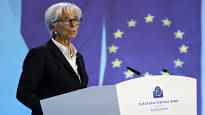All three key interest rates will now rise by 0.5 percentage points, and similar increases are expected next year as well. The story will be updated.
Anna Karismo,
Elli-Alina Hiilamo
14:48•Updated 16:20
The European Central Bank (ECB) raises all three key interest rates by 0.5 percentage points. This way, for example, the most common reference rate, i.e. the banks’ “overnight” deposit rate, rises to two percent.
– Due to inflationary pressures, we intend to raise interest rates in the future as well. Inflation will remain too high and for too long, CEO Christine Lagarde said at a news conference.
According to Lagarde, interest rates will be raised “at a steady pace for some time”. That means increases of about half a percentage point in future meetings as well. The statement immediately accelerated market interest rates to rise, as brokers anticipated the future price of money.
The ECB Council meets approximately every six weeks.
Braking from before
Most recently, at the end of October, the ECB increased all three key interest rates by 0.75 percentage points, so it is now a mild braking compared to previous increases.
The ECB’s decision directly affects the reference interest rates that, for example, mortgage and car loan customers pay to banks.
The market has already priced future rate hikes into reference rates. The most commonly used 12-month euribor is now 2.87 percent. Euribor was in the negative for a long time and rose above zero in April for the first time in many years.
How well do you manage monetary policy? Test your knowledge in ‘s quiz.
Slowing down the withdrawal rate gives the ECB a breather in a situation where the acceleration of inflation seems to have abated and the outlook for the economy has weakened.
However, the ECB says that it intends to raise interest rates “significantly” again, because inflation, i.e. the rise in consumer prices, will remain high next year as well.
Get rid of government debt
The ECB also plans to start withdrawing from the subsidized purchases of government bonds from the beginning of next March. It means that when the assets mature, the capital to be repaid is no longer reinvested.
By the end of June, the ECB plans to reduce its balance sheet by 45 billion euros. The central bank will decide on the deductions after that later.
The Central Bank has generously supported the debts of governments and companies since 2014. At the beginning of the corona pandemic, bond purchases were accelerated.
Over the years, the ECB’s balance sheet has quadrupled to 8.8 thousand billion euros. Just eight years ago, the balance was 2.2 thousand billion. In practice, that is how much the eurozone has been in debt during the same period.
A recession is looming
On Thursday, the central bank also predicted future economic development. According to Lagarde, the future is now exceptionally foggy.
The ECB also clearly raised its estimate of the future rate of inflation. The ECB estimates next year’s price increase to be 6.3 percent, which is well above the bank’s two percent target.
In the ECB’s opinion, the economy may now contract at the end of the year and at the beginning of next year. That would mean that the eurozone economy is in recession.
– The situation is very uncertain when the development of the global economy weakens and financial conditions tighten, the bank says in the announcement (you will switch to another service).
According to the ECB’s estimate, the economy will grow by 3.4 percent this year, but only 0.5 percent next year.
According to Lagarde, a positive aspect of economic development is the slight improvement in employment in the euro area. Unemployment is at a historic low.
The pace of future rate hikes is uncertain
Principal Analyst by Jan von Gerich according to the ECB’s interest rate decision this time was more uncertain than in the past.
According to the chief analyst, this is due to the fact that the ECB leadership did not receive a consistent signal about whether now is the right time to start putting the brakes on interest rate hikes.
– There are certainly differences of opinion on this within the council, von Gerich said before the interest rate decision.
Senior market economist at Finanssirymm OP Jari Hännikäinen anticipates that the central bank will hint in the direction of tightening monetary policy.
– However, the ECB hardly wants to tie its hands at this stage regarding the February interest rate hike, he wrote in his comment earlier in the day.
Does the current monetary policy provoke thought? You can chat below until Friday night at 11pm.
More on the subject:
Olli Rehn on the first morning – what do you want to ask the Governor of the Bank of Finland?
